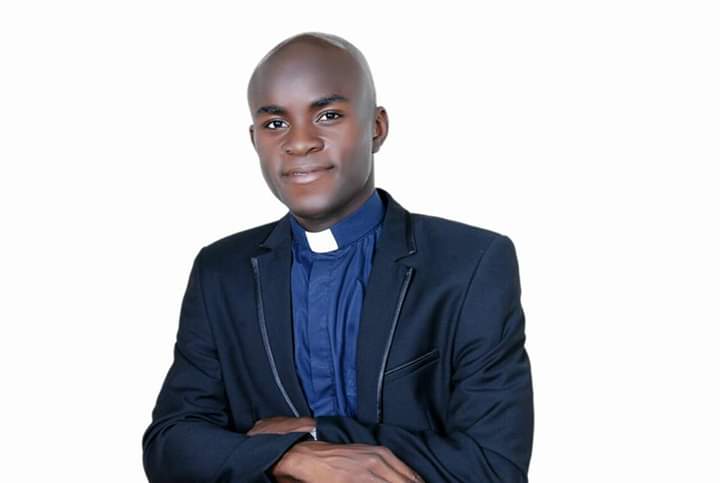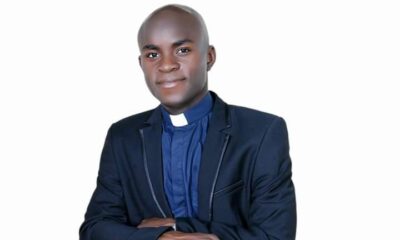Homilies & Reflections
The Solemnity of Pentecost, Year B by Rev. Fr. Lucas Binnah Junior
First Reading: Acts 2:1-11/Responsorial Psalm: Psalm 104:1ab.24ac.29bc-30.31.34 (R. cf. 30) Second Reading: Galatians 5:16-25/Sequence/Gospel: John 15:26-27, 16:12-15
Theme: Holy Spirit: Giver of Life
The Jews do celebrate many festivals. Among them, three stood out with great importance. Pentecost is one of them. The other two are the Passover (Unleavened Bread) and the Feast of Tabernacles (cf. Ex. 23:14-17). Every Jew, especially men who have come of age was legally expected to go to Jerusalem three times a year to participate in these celebrations. This explains why at age twelve, Jesus, together with Mary and Joseph went up to Jerusalem for the Passover feast (cf. Lk. 2:41-42). It is from this background that one can understand the rationale behind the gathering together of Jews from the Diaspora in Jerusalem. It was at Pentecost that the Holy Spirit descended on the believers in a spectacular manner. As a result of their sojourn in foreign lands, the Diasporean Jews had acquired different languages apart from Hebrew and Aramaic.
From its Greek etymology, Pentecost means ‘the Fiftieth’ (Greek: Penta for five). This was so called because it fell on the fiftieth day which is a week of weeks (7×7), after the Passover. That is why the festival is also called “the Feast of Weeks.” Thus, Pentecost is calculated fifty days after Passover (what we call Easter). This feast has both a historical and agricultural significance. Historically, it commemorates the giving of the Law to Moses on Mount Sinai, and in terms of its agricultural connotation, it is an occasion to thank God for the gathering of harvested crops. In view of this, the Jews show their appreciation to God by offering two loaves of barley bread.
We must not hesitate to add here that the Holy Spirit did not come into existence at Pentecost. The Holy Spirit is the third Person in the Holy Trinity. Thus, God is eternally Father, Son and Holy Spirit. From the very beginning, God said “Let us make man in our image and likeness” (Gen. 1:26). At creation, all the three Persons were present. The Father created through the Son in the Spirit (cf. Gen. 1:2, Jn. 1:1-4, 14). All through the history of humanity, the Spirit of God has been present. The Spirit spoke through the prophets and inspired the biblical authors (cf. Acts 1:16, 28:25). Therefore, the Spirit is eternal. However, something spectacular happened at Pentecost occasioned by the descent of the Spirit. The disciples of Christ were empowered as never before to live and witness to the risen Lord. This is what we celebrate in today’s liturgy.
Thus, we are told in the first reading that “When the day of Pentecost had come, they were all together in one place” (Acts 2:1). They were of one mind, one heart, one purpose, and one vision. They were united in faith, and this unity was unshakeable. Under the leadership of the Apostles and the maternal patronage of Mary the mother of Jesus, the early Christians waited in fervent prayers for the empowerment of the Holy Spirit. They strongly believed in the promise of Jesus: “Now you shall be witnesses to this [see Lk. 24:46-47]. And this is why I will send you what the Father promised. So, remain in the city until you are invested with power from above” (Lk. 24:49b). In fact, today’s Gospel has it that Jesus had indicated: “When the Counsellor comes, whom I shall send to you from the Father, even the Spirit of truth, who proceeds from the Father, he will bear witness to me; and you also are witnesses, because you have been with me from the beginning … When the Spirit of truth comes, he will guide you into all the truth” (Jn. 15:26-27, 16:13). Before now, they lived in fear, a trepidation that sapped their joy, peace and being. With the assurance of the promise of Christ, the believers lived in expectation, a ray of hope lightened them up and life returned to them. Therefore, they yearned for the fulfilment of Christ’s promise, and truly, they were satisfied on Pentecost day!
This was the preparation which occasioned the descent of the Holy Spirit. The power from on high, the Counsellor, the Spirit of truth, the Guide and Teacher, descended on the believers in a mighty way. At the Tower of Babel (cf. Gen. 11), there was confusion of tongues. However, at Pentecost, Jews domiciled in different nations plus converts to Judaism were able to understand deeply in their hearts and declare the mighty works of God. They spoke in tongues such that, although unintelligible in itself, they were able to pierce through the mysteries of God in a very captivating manner as never before. Abundant love poured forth, filling their souls and bursting out in joy. This was so because they spoke the language of love, and love is the only language everybody understands. The Holy Spirit himself is Love Subsistence, the Love between the Father (Lover) and the Son (Beloved). And the Spirit makes us feel God’s presence in our lives.
We must be quick to notice the symbol of fire; a fire in a burning bush that leaves its herbage still green and fresh (cf. Ex. 3:2-3); a fire of love, burning within us to produce righteousness, holiness, selflessness, genuineness of character, unity, sense of fraternity, desire for obedience, zeal for souls and passion for evangelisation. This was how Christianity was born; it was at the instance of the Spirit, who makes the Father and the Son present to us, and also comes to renew all things in Christ, giving the nascent Church new life. The Responsorial Psalm echoes this thus: “Lord, send forth your Spirit, and renew the face of the earth” (Ps. 104:30). No wonder the Christian Creed calls the Holy Spirit Giver of Life. Even now, renewal at both individual and community levels is at the instance of the Spirit and we must do well to yearn for the Holy Spirit.
In view of the aforesaid, St. Paul addresses his letter to the Galatians and to us also, to be aware of the signs which indicate whether we are living in the Spirit or in our sinful nature (flesh). He mentions fifteen (15) vices against nine (9) virtues as the second reading depicts. He calls the vices works of the flesh which lead to death (cf. Gal. 5:19-21), while the virtues, fruits of the Spirit, lead to life (cf. Gal. 5:22-23). It is said of the Italian Renaissance artist, Leonardo da Vinci (1452-1519), that when he began painting the Last Supper, he made a young man pose for the person of Jesus, and in eleven months painted eleven disciples. However, to find a man suitable to pose for the person of Judas, it took Leonardo eleven years. Finally, he found one with harsh and hard face, and when he began to paint him, the man wept inconsolably. So, da Vinci stopped working and asked whether he did something to upset him. In response, the man said, “Master, do you not recognise me?” To this, Leonardo replied, “I’m sorry I don’t. Have we met before?” The man said, “Yes, eleven years ago, you made me pose for the person of Jesus in this same painting.” In each one of us, there is a Jesus and a Judas, the best version of ourselves as well as the bad – virtues and vices – at war with each other! The challenge for us every day is to allow the Spirit to control us as John the Baptist would say about Jesus: “He must increase and I must decrease” (Jn. 3:30). When the Holy Spirit is allowed in our lives, he is able to turn our weaknesses into strengths, burdens into blessings, trials into triumphs and tests into testimonies.
Revealingly, we observe again in the second reading that the first fruit of the Spirit mentioned is love, the mother of all virtues, the spiritual adhesive which binds all the other virtues together (cf. Col. 3: 12-14). Does this ring a bell to draw our attention to the first reading where the believers, who had gathered in love and prayer experienced the Holy Spirit? They spoke in different tongues, yet they understood what each was speaking in their own tongue because the language everybody understands is love. Love is the commandment, the new Law – love of God and neighbour. Love must be our motivation and love will show the way! Wherever people live in love, the Holy Spirit is truly present and at work, for he is the new law of the Christian!
Beloved in Christ, life comes from God through the Holy Spirit. Even if our lives have been battered, tattered and shattered by sin and evil, there is still hope for us. If we repent and desire the Holy Spirit in genuine prayer and fear of God, we shall be sanctified, renewed, recreated and vivified. Let us make friends with the Holy Spirit through a personal relationship of devotion. A blessed Pentecost and may God bless us! Remember: #The-Holy-Spirit-Is-The-Giver-Of-Life#
Prayer: Come O Holy Spirit, fill the hearts of your faithful! And enkindle in them the fire of your Love. Send forth your Spirit, and they shall be created. And you shall renew the face of the earth. God, who by the light of the Holy Spirit, instructed the hearts of the faithful. Grant that, by the same Spirit, we may be truly wise and ever rejoice in his consolation. Through Christ our Lord. Amen
By Rev. Fr. Lucas Binnah Junior, C.S.Sp.
Sharing is caring!
Ghana Catholic News aim to provide up to date news on the Catholic Church in Ghana on various disciplines such as diocese, priesthood, programs/events, promoting of the Catholic faith, daily readings, homilies, Catechism, etc.





